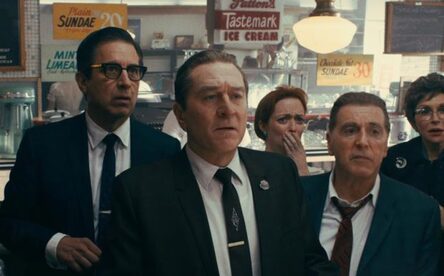A- | A Mafia goon reflects on his life working for mob bosses and Jimmy Hoffa Directed by Martin Scorsese Starring Robert de Niro, Joe Pesci, and Al Pacino Review by Jon Kissel |

Such a high placement in the underworld alienates Sheeran from his family, and not in the usual way that Scorsese depicts unwitting Mafia families. Scorsese can do the rise-and-fall gangster story in his sleep, but once a person has made Goodfellas, Casino, and Wolf of Wall Street, why go that well once more? The film, with a script by Steven Zallian, leaves Sheeran nowhere to hide from his murderous deeds. He’s not a charmer, but a lunkhead who thinks the highest good is to follow orders. He stands up for his daughter, the observant cornerstone character Peggy (Lucy Gallina as a child, Anna Paquin as an adult), when she’s treated roughly by a grocer, but the act of taking revenge on the grocer is shown to be horrifying and alienating, stripped of any righteousness or street justice. His kills are sometimes mistakes, and are sometimes performed in front of the victim’s families. He is given no chance to make amends with his family or his god as he nears the grave in a nondescript and lonely nursing home. He believes himself to be merely a tool lacking in will. Frank Sheeran is the walking fallacy of ‘I did it to keep my family safe’ or ‘I did it to provide for my family,’ and he represents that lie so fully that the effect is the same as a musician biopic forgetting to update itself post Walk Hard.
Scorsese has long dealt with the bad fan or the misguided critic who confuses depiction with endorsement, up to and including inspiring a presidential assassin with Taxi Driver. No one could accuse The Irishman of doing the same. Some scrap of that might be on the digitally de-aged cast who can’t bring the same deliriousness to their roles like decades-younger Leonardo DiCaprio can, but the unglamorous of this brand of Mafia life is also surely the point. So much point-A to point-B driving, so many late nights, so many stakeouts, so many ugly murders and the traumatized witnesses who have to go on after. Neither Frank nor higher-up Russell appear to be living in the lap of luxury with their ill-gotten gains. The Irishman posits all of the extortion and corruption and theft and violence as another job that one has to wake up and head out the door for, stripped of all Godfather-esque romanticism and left with nothing but gaudy rings. Characters are introduced with their epitaphs, foreshadowing a meaningless end that will happen off-camera. That the film becomes no less watchable without the style of Goodfellas, especially at three and a half hours, is a testament to the cast and Scorsese’s ability to keep things perpetually compelling.
De Niro is a strong center of the Irishman, and Pesci, in his smooth dignity, has not lost a single step away from movie sets, but I came away from this once again in love with Pacino. This lacks the hammy theatricality of his worst 90’s and 21st career, which isn’t to say that he doesn’t go big. Pacino’s Hoffa is perfectly calibrated to the showmanship of a man who must be a credible and inspiring leader to thousands of roughneck truckers across the country. When The Irishman is most reminiscent of Scorsese’s ‘fun’ gangster films, it’s when Hoffa’s giving a speech and whipping the crowd into a frenzy. That the viewer can know that Hoffa is a corrupt figure and still believe in every word he’s saying onstage to the point where one’s throat starts getting tight at his bygone exaltation of labor as a vital force in America makes this the best thing Pacino’s done in decades. He’s also hilarious in his interactions with lesser figures, which the great man judges everyone to be, and affecting in every deliberate step he takes as he walks towards his death at Sheeran’s hands.
In Sheeran’s voiceover, he reminisces about his first murders during World War II when an officer would curtly order him to take Nazi prisoners into the woods and take care of it. As he watches the condemned dig, he remembers wondering why they’re doing it when they surely know what’s coming. Sheeran’s executed Nazi’s, fellow order-followers who justified their identical misdeeds in exactly the same way Sheeran does, hang over the rest of the film, not because this will be the worst thing Sheeran ever does but because of how he thinks about it. The Nazi’s spend a couple hours digging through the dirt, but it takes Frank his whole life to do the same. He’s only alive in the physical sense in the film’s final half hour, an empty shell who doesn’t have anything or anyone but his stories and his secrets, both of which cost him his family and friends. It’s hard to hate him due to the shallow pathos that De Niro gives him and Pesci’s surprising likability, especially in contrast to the swaggering machismo of so many other gangsters, but there’s rarely been a film that so perfectly places its anti-hero in a hell of his own making. Directors will continue to make mob movies after this one, as global cinema is littered with great ones, but it’s hard to imagine them improving after The Irishman. It is a period at the end of a century-long sentence, and yet another reminder of Scorsese and co’s bottomless brilliance. A
 RSS Feed
RSS Feed